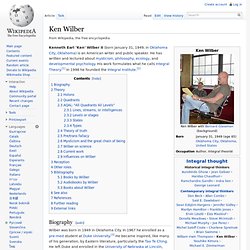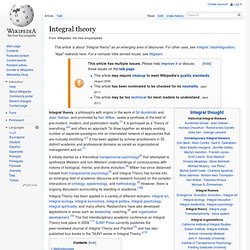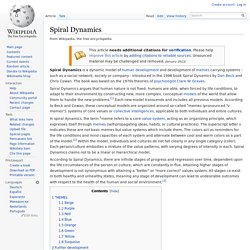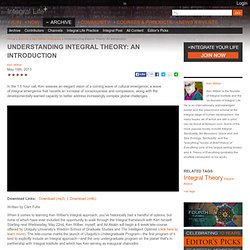

Ken Wilber. Kenneth Earl "Ken" Wilber II (born January 31, 1949, in Oklahoma City, Oklahoma) is an American writer and public speaker.

He has written and lectured about mysticism, philosophy, ecology, and developmental psychology. His work formulates what he calls Integral Theory.[1] In 1998 he founded the Integral Institute.[2] Biography[edit] Wilber was born in 1949 in Oklahoma City. In 1967 he enrolled as a pre-med student at Duke University.[3] He became inspired, like many of his generation, by Eastern literature, particularly the Tao Te Ching. In 1973 Wilber completed his first book, The Spectrum of Consciousness,[5] in which he sought to integrate knowledge from disparate fields. In 1982 New Science Library published his anthology The Holographic Paradigm and other Paradoxes[6] a collection of essays and interviews, including one by David Bohm.
In 1983 Wilber married Terry "Treya" Killam who was shortly thereafter diagnosed with breast cancer. Theory[edit] Holons[edit] Integral theory. Integral theory, a philosophy with origins in the work of Sri Aurobindo and Jean Gebser, and promoted by Ken Wilber, seeks a synthesis of the best of pre-modern, modern, and postmodern reality.[1] It is portrayed as a "theory of everything,"[2] and offers an approach "to draw together an already existing number of separate paradigms into an interrelated network of approaches that are mutually enriching.

"[1] It has been applied by scholar-practitioners in 35 distinct academic and professional domains as varied as organizational management and art.[1] Methodologies[edit] AQAL, pronounced "ah-qwul," is a widely used framework in Integral Theory. It is also alternatively called the Integral Operating System (IOS) or by various other synonyms. Sri Aurobindo, Jean Gebser, and Ken Wilber, have all made significant theoretical contributions to integral theory. AQAL Theory – Lines. Principles and Properties: Lines in all quadrants: “What am I aware of?” Contemporary figures[edit] Themes[edit] H. Spiral Dynamics. In spiral dynamics, the term vmeme refers to a core value system, acting as an organizing principle, which expresses itself through memes (self-propagating ideas, habits, or cultural practices).

The superscript letter v indicates these are not basic memes but value systems which include them. The colors act as reminders for the life conditions and mind capacities of each system and alternate between cool and warm colors as a part of the model.[2] Within the model, individuals and cultures do not fall clearly in any single category (color).
Each person/culture embodies a mixture of the value patterns, with varying degrees of intensity in each. Spiral Dynamics claims not to be a linear or hierarchical model. According to Spiral Dynamics, there are infinite stages of progress and regression over time, dependent upon the life circumstances of the person or culture, which are constantly in flux. vMEMEs[edit] THE FIRST TIER VALUE SYSTEMS; The Levels of Subsistence[5] Beige[edit] Purple[edit] Understanding Integral Theory: An Introduction. Written by Clint Fuhs When it comes to learning Ken Wilber's Integral approach, you've historically had a handful of options, but none of which have ever included the opportunity to walk through the Integral framework with Ken himself.

Starting next Wednesday, May 22nd, Ken Wilber, myself, and Ali Akalin will begin a 6 week tele-course offered by Ubiquity University's Wisdom School of Graduate Studies and The Intelligent Optimist (click here to learn more). The tele-course marks the launch of Ubiquity's Undergraduate Program—the first program of it kind to explicitly include an Integral approach—and the only undergraduate program on the planet that's in partnership with Integral Institute and which has Ken serving as inaugural chancellor. Quite a milestone, wouldn't you say? One worth celebrating in the only way we know how: A tele-course with Ken, of course. But, before you do, let me frame it up for you by way of introducing the tele-course.
Learn More & Enroll.